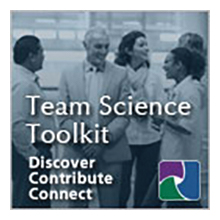Choose Your Own Adventure Session: Ocean Memory
Tuesday, August 2, 2022
4:30 PM - 5:30 PM ET
|
Challenges and Opportunities in Organizing a Cross-Disciplinary, Virtual Seminar Series and Workshop around Ocean Memory
Jacob Cram
Abstract: What are some successes and challenges in facilitating *virtual* cross-disciplinary interactions? Anecdotally, regular engagement with the same group of people seems to build relationships more effectively than all immersive workshops. Furthermore, by spreading workshops over time, rather than concentrating activities on limited days may provide opportunity to build familiarity between participants and decrease participant burnout.In 2021 I co-organized a virtual seminar series, and in 2022 a virtual workshop, in connection with Ocean Memory Project (OMP). I have participated as a non-organizer in another workshop and a regular informal meetup. My involvement started in spring of 2020, after the beginning of the COVID-19 pandemic, my engagement with OMP has been entirely in virtual forums. While, informal interactions are often challenging in online forums; I think informal regular meetings, interactions between organizers as larger events are planned, and mixed format workshops have facilitated rewarding cross-disciplinary interactions.Informal check-in meet-ups: After the 2020 seed workshop participants had the option to meet with whoever decided to show up once a week for a while. I found that regular interaction really helped to get to know people better.Planning events: For both the 2021 seminar series, and the 2022 workshop I met with two to three other organizers regularly to make plans. Planning gave structure to the meetings, but because there were only a few people it was easy to get to know the other organizers.Mixed formats for meetings: The format for our 2022 seed seminar on ocean memory and sense to combine plenary seminars, where everyone listened to the same talk, breakout discussions, and "asynchronous" activities. One asynchronous activity was a "smell walk" in which a perfumer and sound designer worked together to create an experience where each participant would find smells in a local coastal environment, while listening to instructions through an mp3 file. Another was self directed research. Seminars and asynchronous activities created opportunities for discussion and collaboration. A challenge with this format was that discussions, limited to about 45 minutes at a time, felt rushed. I think this is a fundamental limitation of a three day virtual workshop. While an in-person workshop can leverage conversations after hours, virtual workshops tend to happen in the background of participants trying to continue to manage their lives. It is difficult to ask somebody to be online for the amount of time one might spend this much time socializing at an in-person workshop. We experimented with moving some of the discussion from the days of the workshop to a later week, which appeared to be well received. I recommend that future interdisciplinary meetings consider promoting regular meetings in shorter blocks, rather than intensive multi-day workshops.
|
|
The Lost City and Ocean Memory
Anna Davidson
Abstract: Discovered in 2000, the Lost City is a network of seafloor hydrothermal vents located on the Atlantis Massif, an underwater mountain on the Mid-Atlantic Ridge of the Atlantic Ocean. The stunning towers of the Lost City are constructed from minerals formed when hot fluids flow through seafloor rocks uplifted from Earth's mantle. These hot, alkaline fluids carry methane and hydrogen, the ingredients needed to support the site's unique, extremophilic microbes. Many oceanographers think these organisms share similarities with the first forms of life on the planet, making it home to a long line of evolutionary memory. In other words, the Lost City is a place deep in the ocean that holds the memories of life first forming on planet Earth. In 2018, scientists returned to the Lost City to learn more about its unusual microbial residents. I joined this oceanic expedition as an artist in residence and spent 24 days at sea on the research vessel Atlantis, during which time I began a body of work focused on this site, ocean memory, and oceanic conservation. These topics are expressed through sculpture, video, photography and drawing.To learn more about the Lost City please visit https://lost-city-hydrothermal.github.io/.To learn more about my artwork visit www.annadavidson.art.
|
|
The Ocean Memory Project - An Ongoing Transdisciplinary Experiment
Heather Spence
Abstract: The Ocean Memory Project (OMP) is a collaborative network of researchers from across the Sciences, Arts and Humanities dedicated to exploring the intersection of Ocean and Memory, and advancing Ocean Memory as a new field of scholarship and creative expression. Born at a National Academies Keck Futures Initiative (NAKFI) Conference "Discovering the Deep Blue Sea" in 2016, and recipient of one of only three NAKFI Challenge grants, the OMP community and its diverse forms of research continues to grow. This short presentation will briefly describe, from the perspective of some of its initiators and co-leaders, the basis for the idea of Ocean Memory, and tell the story of the ocean memory project and the successes and challenges of leading such a radically trans-disciplinary effort.
|
|
Ocean Memory - Performative Extremofile
Danielle M Siembieda
Abstract: In this online performance, artist Danielle Siembieda will be present in the form of her alter ego, Jean Gnome, a morphing microbial being. Jean Gnome aims to share the scientific narratives and understandings of the biological world by using social mediums such as Instagram to interview the science community about their research. Siembieda is a member of the Ocean Memory Project to explore the question, "Does the Ocean have Memory?" In this presentation, the direction of answering this question starts with the smallest organism whose strength is surviving in the most challenging environments. Jean Gnome will anthropomorphize the extremophile Pyrococcus furiosus that thrives in geothermal, marine sediments. As part of the understanding and research for this performance, Siembieda will be using excerpts from known scientific papers and interviewing scientists specializing in extreme environments. This outcome will embody speculative fiction and animated facial filters.
|
|

